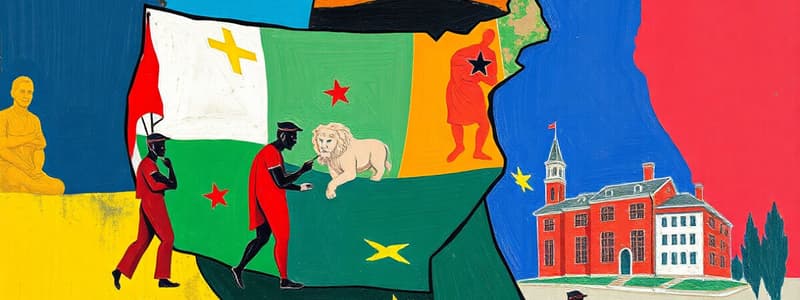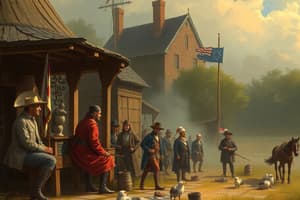Podcast
Questions and Answers
What principle led to the phrase 'no taxation without representation' and why was it significant to the colonists?
What principle led to the phrase 'no taxation without representation' and why was it significant to the colonists?
The principle is that colonists should not be taxed by a government in which they have no elected representatives. It was significant because it fueled resentment towards British authority and motivated the demand for political representation.
How did the Stamp Act impact various professions in colonial society?
How did the Stamp Act impact various professions in colonial society?
The Stamp Act disproportionately affected judges, lawyers, and newspaper editors as they relied on stamped documents for their work. This created widespread discontent among influential groups who rallied against the tax.
What were the reasons for the fear of corruption associated with the Stamp Act in the colonies?
What were the reasons for the fear of corruption associated with the Stamp Act in the colonies?
There was fear that officials could exploit their power in stamp collection, leading to intimidation and abuse, such as charging unnecessary fees. This created distrust in government processes and the actions of British officials.
What was the outcome of colonial pushback against the Stamp Act and what subsequent legislation was introduced?
What was the outcome of colonial pushback against the Stamp Act and what subsequent legislation was introduced?
Explain the difference between passive and active resistance demonstrated by the colonists.
Explain the difference between passive and active resistance demonstrated by the colonists.
What was Benjamin Franklin's role in the Albany Congress of 1754?
What was Benjamin Franklin's role in the Albany Congress of 1754?
How did the Proclamation Line of 1763 affect colonial attitudes?
How did the Proclamation Line of 1763 affect colonial attitudes?
What was the main purpose of the Sugar Act of 1764?
What was the main purpose of the Sugar Act of 1764?
What was the colonial response to the Stamp Act of 1765?
What was the colonial response to the Stamp Act of 1765?
Who was Patrick Henry and what did he advocate regarding taxation?
Who was Patrick Henry and what did he advocate regarding taxation?
What was the impact of the French and Indian War on British colonial policy?
What was the impact of the French and Indian War on British colonial policy?
What did the Committee of Correspondence do?
What did the Committee of Correspondence do?
What inventions is Benjamin Franklin known for during his lifetime?
What inventions is Benjamin Franklin known for during his lifetime?
What was the significance of Franklin's decision to represent Pennsylvania in London?
What was the significance of Franklin's decision to represent Pennsylvania in London?
How did the British government's military presence contribute to colonial tensions?
How did the British government's military presence contribute to colonial tensions?
Flashcards are hidden until you start studying
Study Notes
The Albany Congress
- In 1754, the Albany Congress convened with a goal of uniting the colonies under a single government.
- Benjamin Franklin proposed a plan for colonial unity, but it was ultimately rejected by the colonies.
The Proclamation Line of 1763
- This line restricted colonial westward expansion to prevent conflict with Native Americans.
- It was met with discontent by colonists seeking land acquisition, particularly in Boston and New York.
The French and Indian War
- This war plunged the British government into heavy debt.
- The colonists were expected to contribute to the war effort and subsequent debt repayment.
The Sugar Act (1764)
- This act imposed taxes on luxury items imported to the colonies.
- It aimed to generate revenue and reduce the colonial debt.
- The colonists organized protests and formed the Committee of Correspondence to coordinate resistance.
The Stamp Act (1765)
- This act levied taxes on all paper documents, including newspapers and playing cards.
- It was met with widespread defiance and sparked the Sons of Liberty and Daughters of Liberty organizations.
- The act spurred debates regarding the principle of "no taxation without representation."
- It highlighted the inherent power imbalances and concerns about corruption within the colonial government.
- The act was ultimately repealed but replaced with the Declaratory Act of 1766, asserting British sovereignty over the colonies.
Colonial Frustrations with the Stamp Act
- The principle of "no taxation without representation" was central to the colonists' grievances.
- The act's uneven impact affected individuals in various professions, including lawyers, judges, and newspaper editors.
- The colonists perceived the act as a blatant attempt by the British to generate revenue.
- Their concerns regarding corruption stemmed from the potential abuse of power by tax collectors and the lack of accountability.
Resistance to the Stamp Act
- The colonists responded with both passive and active resistance.
- Passive resistance included boycotts and noncompliance.
- Active resistance ranged from symbolic acts of defiance to violent acts, such as the Boston Massacre.
- These forms of resistance demonstrated colonial dissatisfaction with British policies.
Studying That Suits You
Use AI to generate personalized quizzes and flashcards to suit your learning preferences.




